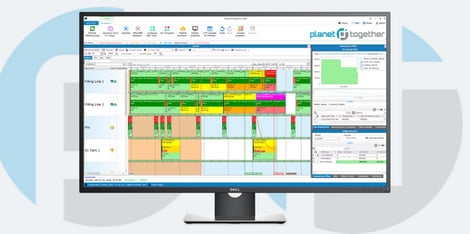The Complexity of Pharmaceutical Production Scheduling
In pharmaceutical manufacturing, production scheduling is not merely a logistical challenge; it’s a mission-critical function. Stringent regulations, batch-specific requirements, and the need for maintaining traceability add layers of complexity that production schedulers must navigate daily. To succeed in this high-stakes environment, schedulers require advanced tools capable of managing dynamic workflows, forecasting accurately, and optimizing resources efficiently.
Enter PlanetTogether, a leader in Advanced Planning and Scheduling (APS) software. When integrated with enterprise resource planning (ERP) systems like SAP, Oracle, Microsoft Dynamics, Kinaxis, or Aveva, PlanetTogether can unlock unparalleled efficiencies, transforming production scheduling from a reactive task to a strategic capability.
![]()

The Role of Integration in Production Scheduling
Effective scheduling in the pharmaceutical sector depends on real-time data synchronization. ERP systems provide the backbone of enterprise operations, centralizing data on inventory, procurement, and production orders. However, their scheduling modules often lack the granularity required for the intricate needs of pharmaceutical production.
Integrating PlanetTogether with ERP platforms bridges this gap. For example:
SAP and PlanetTogether: SAP delivers a robust foundation of master data management and transaction processing. By linking this with PlanetTogether, schedulers gain an APS tool that enhances SAP's capabilities with detailed sequencing and scenario planning.
Oracle and PlanetTogether: Oracle's ERP solutions are renowned for their scalability. Coupled with PlanetTogether, they enable pharmaceutical manufacturers to perform predictive scheduling based on both operational constraints and market demands.
Microsoft Dynamics and PlanetTogether: This integration provides flexibility and is particularly useful for mid-sized pharmaceutical manufacturers seeking to scale operations without adding complexity.
Kinaxis and PlanetTogether: Known for its strength in supply chain planning, Kinaxis, when paired with PlanetTogether, offers end-to-end visibility that seamlessly links production schedules with supply chain considerations.
Aveva and PlanetTogether: For facilities heavily invested in digital transformation, this duo supports advanced manufacturing workflows, leveraging IoT and predictive analytics to refine scheduling decisions.

Key Benefits of PlanetTogether-ERP Integration for Pharmaceutical Schedulers
1. Enhanced Visibility Across Operations
Pharmaceutical manufacturing relies on precise coordination between departments. The integration of PlanetTogether with an ERP system provides a unified view of production activities, inventory levels, and supply chain dynamics. For example, a scheduler can instantly see how delays in raw material delivery affect production timelines, enabling proactive adjustments.
2. Improved Resource Utilization
PlanetTogether’s capacity planning tools excel at optimizing resource allocation. When linked with ERP data, these tools can analyze real-time availability of equipment, labor, and materials to minimize downtime and maximize throughput. In pharmaceutical plants, where specialized equipment often becomes a bottleneck, this is a game-changer.
3. Compliance and Traceability
Regulatory compliance is non-negotiable in pharmaceutical manufacturing. Integrated systems ensure that production schedules account for critical parameters like batch records, expiry dates, and cleaning validation cycles. PlanetTogether’s integration with ERP systems ensures audit readiness by maintaining a clear digital thread across all scheduling activities.
4. Scenario Planning for Better Decision-Making
Schedulers often face what-if scenarios: What happens if a machine fails? Can we prioritize an urgent production order without disrupting other commitments? PlanetTogether’s advanced scenario planning tools, powered by real-time ERP data, provide answers, enabling schedulers to evaluate multiple outcomes and select the optimal path.
5. Streamlined Collaboration
By integrating PlanetTogether with ERP systems, data silos are eliminated, fostering collaboration among production schedulers, supply chain teams, and plant managers. Everyone works with the same data, ensuring alignment on priorities and timelines.

Overcoming Challenges in Integration
While the benefits are compelling, integrating PlanetTogether with ERP platforms is not without challenges. Pharmaceutical manufacturers must address the following to ensure a successful implementation:
Data Accuracy: The quality of the integration depends on the accuracy of data within the ERP system. Efforts should be made to clean and standardize data before integration.
Change Management: Transitioning to a new scheduling approach requires buy-in from stakeholders across the organization. Comprehensive training is essential to ensure adoption.
Customization Needs: Pharmaceutical processes are highly specific. Ensuring that the integration accommodates unique workflows, such as those involving biopharmaceutical production, is critical.

Best Practices for Successful Integration
Define Clear Objectives: Identify the specific scheduling challenges you aim to address through integration, whether it’s reducing lead times, improving compliance, or increasing flexibility.
Engage Stakeholders Early: Include representatives from production, IT, quality assurance, and supply chain teams in the integration process to ensure all needs are met.
Leverage Vendor Expertise: Both PlanetTogether and ERP providers like SAP or Oracle offer valuable resources and support for integration projects. Utilize their expertise to streamline the process.
Monitor and Iterate: Post-integration, continuously monitor performance metrics such as schedule adherence and resource utilization. Use these insights to refine processes further.
As the pharmaceutical industry embraces digital transformation, the integration of advanced APS tools like PlanetTogether with ERP systems will become the norm rather than the exception. Emerging technologies such as artificial intelligence (AI) and machine learning (ML) will further enhance scheduling capabilities, enabling predictive and prescriptive analytics. These advancements promise to elevate the role of production schedulers, allowing them to focus on strategic decision-making rather than day-to-day firefighting.
For production schedulers in pharmaceutical manufacturing, the integration of PlanetTogether with ERP systems such as SAP, Oracle, Microsoft Dynamics, Kinaxis, or Aveva represents a powerful opportunity to overcome industry challenges. By combining the strengths of ERP platforms in data management with PlanetTogether’s advanced scheduling capabilities, manufacturers can achieve greater efficiency, compliance, and agility.
Investing in such integrations is not just about keeping up with industry trends—it’s about staying ahead. With the right tools and strategies, production schedulers can play a pivotal role in driving operational excellence and ensuring that life-saving medications reach patients on time.
By embracing the potential of integrated systems, pharmaceutical manufacturers can transform their production scheduling processes, setting the stage for sustainable growth and innovation in a rapidly evolving industry.
Are you ready to take your manufacturing operations to the next level? Contact us today to learn more about how PlanetTogether can help you achieve your goals and drive success in your industry.
Topics: PlanetTogether Software, Improved Resource Utilization, Integrating PlanetTogether, Streamlined Collaboration, Compliance and Traceability, Pharmaceutical Manufacturing, Enhanced Visibility Across Operations, Scenario Planning for Better Decision-Making





















LEAVE A COMMENT